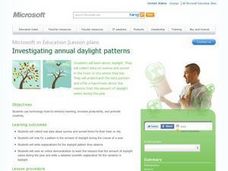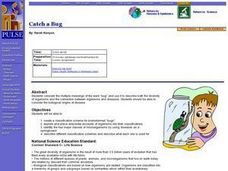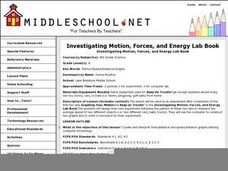Curated OER
Eating Up Energy
Pupils will compare and contrast amount of energy consumption and CO2 emissions among the top ten user countries to understand global effects of emissions. They also map the global impact of energy consumption and CO2 emissions.
Curated OER
Investigating daylight
learners investigate a natural factor affecting their everyday lives: daylight. First, they collect data on sunrise and sunset in their hometown, create a Microsoft Office Excel chart to help them understand the data pattern, and offer a...
Curated OER
Beat the Greeks
Students conduct research of the history of atomic theory. Information is presented from Democritus and Aristotle to the early Renaissance using the Internet and video.The integration of technology allows for a vast amount of research...
Curated OER
Remember the Egg!
Learners investigate how to see, describe and draw faint or subtle features on an object which is thought of by most people as having a smooth, featureless surface. The exercise is important to reinforce skills in making observations...
Curated OER
Arsenic and Human Health
Ninth graders concentrate on arsenic poisoning as an example of the connections among health, geography, and geology as they develop a persuasive presentation about the dangers of arsenic in the drinking water, targeting a specific...
Curated OER
The Chemistry of Coal
Students investigate the chemistry of coal. This lesson serves as a review of conservation of mass, simple reactions and equation balancing. During the lesson, students research chemical components of coal, as well as environmental...
Curated OER
Thinking about Energy
Students navigate through a web-based survey to help engage curiosity about energy concepts. They describe how prior perceptions influence examineing of energy concepts. They evaluate comprehension about concepts of energy.
Curated OER
What was Newton's Idea of Science?
Students form logical foundations for analysis of observations. They improve analytic reading abilities through practice. Students investigate the foundations of scientific thought processes and how to apply them.
Curated OER
On Thinning Ice: An eco-theatre production about climate change
Students investigate the causes and possible consequences of climate change in the north, and realize their choices and actions can help reduce climate change. Some of the skills involved in the lesson are discussion, synthesis,...
Curated OER
Causes and Effects of Earthquakes and Volcanoes
Tenth graders discuss the techniques and tools scientists use to study about the earth, including techniques used to determine geological time scales. They share their personal experiences of earthquakes and volcanoes.
Curated OER
Pumped Up Gas Prices
Students spend one month keeping track of the mileage and gasoline amounts they or their family has used. Information is entered into a spreadsheet to help calculate the average gas prices over time.
Curated OER
Causal Patterns in Air Pressure Phenomena
Pupils explore a scientific concept to obtain understanding by performing an experiment. The inquiry can be done in groups or as a whole class. The outcome is that students can use models to obtain futher understanding.
Curated OER
Causal Patterns in Air Pressure Phenomena
Students explore the concept of how air moves and reflect through working in groups about the scientific concept. This lesson is an extension to another similar lesson. Also students develop and draw their own models.
Curated OER
Relational Causality
Students explore the concept of Bernoullii's Principle and how it behaves. Have each student fold the piece of paper in half. Then have them place the paper like a tent on a smooth surface. Have them blow under it (they can use a straw...
Curated OER
Heating Ice
Students explore through inquiry what it is like to heat ice and the results that can be observed. There is a graph that is created to keep track of data. There are questions that are answered to promote the use of the scientific method.
Curated OER
How Is The Weather?
Studemts explore the purpose of this activity is to make a prediction of the weather in Australia based on prior knowledge. They use technology to help determine if the prediction is correct. Learners will discuss the difference between...
Curated OER
Is it Really Winter in Australia? It is June!
The purpose of this activity is to determine how the location of a place on the Earth (hemisphere) determines what season that place is experiencing relative to the Sun's rays. Day one the pupils will be introduced to the terms equator,...
Curated OER
Is Shep Sherman Innocent or Guilty?
Students engage in this activity to use knowledge acquired in this unit to predict the outcome of the trial in Science Court. The students will then publish their predictions on Microsoft Word.
Curated OER
How Is The Weather?
Learners engage in the purpose of this activity is to make a prediction of the weather in Australia based on prior knowledge. To use technology to help determine if the prediction is correct. Students will discussthe difference between...
Curated OER
Forces Cause Change
Third graders will gain recognition that physical relationships affect each other and that change occurs when one object acts upon another.The teacher will recognize ways in which technology can be used to enhance the understanding of...
Curated OER
Investigating Motion, Forces, and Energy Lab Book
Eighth graders create their own experiements using toy trucks, cars or balls to measure the time it takes two of them to travel 5 meters, as well as at each 1 meter interval. They make use computers to make a time/distance graph and...
Curated OER
Deceleration of a Toy Truck
Eighth graders complete labs using toy trucks to study deceleration, record thier data, and then transfer it to graphing software to produce a graph. They create a lab report of the completed lab using a word processing program.
Curated OER
Global Water Cycle & Heat Flow
Students experiment to discover how different variables affect the water cycle. They do hat flow experiments and construct a computer heat flow model.
























